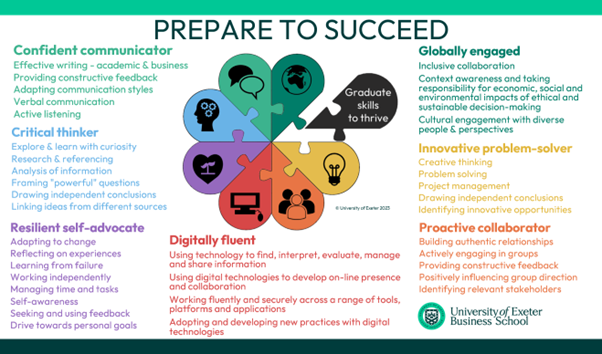How the University of Exeter is embedding skills development into its new curriculum.
Professor Nicky Thomas, Associate Professor of Accounting and Tax Education and Emma Norman, Learning and Pilots Manager, University of Exeter.
In this blog, project co-sponsor Nicky Thomas and project manager Emma Norman outline how the University of Exeter designed its new ground-breaking skills framework. They share how embedding the Exeter Skills Framework into the curriculum will support students from all degree programmes to develop and articulate their progress towards important skills and mindsets.
The higher education sector increasingly recognises that students must be able to articulate and evidence their skills to future employers. Since university represents a significant investment in students’ future, higher education providers must support students to develop relevant skills through curriculum activities. Alongside that, they must provide the tools to help students recognise and effectively articulate their personal significance.

The University of Exeter took a four-pronged approach to achieve this, as part of its curriculum transformation programme:
- Firstly, identify which skills should be signposted to students. Be aware that the most relevant skills may differ across students and programmes, and across time.
- Secondly, map modules and programmes to reveal where skills development already exists in the curriculum, and to identify opportunities for further skills development.
- Thirdly, signpost skills explicitly to students so they are aware and can see their relevance.
- And finally, provide students with the tools and frameworks to reflect on and record these experiences, enabling them to evidence their skills more confidently in future academic and professional contexts.
Through this approach, Exeter has designed and implemented a skills framework and begun the process of mapping its undergraduate portfolio to these skills.
Our progress to date
Creating the University of Exeter’s Skills Framework
The University of Exeter Business School took a pioneering role by developing the Graduate Skills to Thrive framework in 2022. An influential UN report on ‘future proof skills’, and literature on skills gaps and the role of key skills in successful graduate outcomes underpinned its creation. The resulting framework is depicted as a flower with seven interlocking skills “petals” and provides students with clear signposts to the skills covered in modules and learning or assessment activities. Subsequently, the Business School mapped its modules and programmes to identify embedded skills.

The University’s transformation consultation process offered staff and students the opportunity to explore this and alternative skills frameworks. Ultimately, stakeholders strongly supported the Business School’s model. Academics recognised how the skills resonated within their own disciplinary contexts and students appreciated the relevance of the skills to their own programmes. The consultation highlighted that the framework would be even more meaningful if departments could add an eighth disciplinary-specific skills “petal” for example, to capture laboratory skills in the sciences. This approach recognises the unique subtleties across disciplines and acknowledges how skills development varies for students on different programmes. This work led to the creation of a university wide skills framework, built on the Graduate Skills to Thrive.
Consulting Stakeholders
Next, Nicky and the curriculum transformation programme team conducted a consultation process across all disciplines. This helped them refine the detailed skills underlying each of the University-wide skills “petals”. Each petal now has six clearly defined underpinning skills. Disciplines are now considering defining discipline-specific skills-sets such as “Spatially Intelligent,” “Field Scientist,” “Literate Author/Reader,” and “Technically Skilled.”
What’s next?
The skills framework is a tool that helps students to frame reflections on their skills development. After developing the tool, the team’s focus shifted to the remaining two goals: mapping modules and programmes, and signposting skills explicitly to students.
Exeter’s Programme Directors and Deputy Directors of Education and Student Experience (DESEs) are now reviewing programmes to identify where students can develop skills within module assessments. This information enables educators to identify skills gaps and adjust the curriculum as needed. Ultimately, all students will engage with every skill through at least one assessment activity on their programme. The curriculum transformation team is providing colleagues with supporting tools and guidance, including templates and case studies. These help educators to map the framework across their teaching and assessment. In addition to this, they enable colleagues to share practice about the excellent skills-based teaching and learning already taking place at Exeter.
Colleagues in Education Services and Support teams are also creating or tailoring their student resources to support the University of Exeter’s skills framework. Two examples are the Careers Team’s “Create Your Future” programme and the “Essentials Toolkit” recently developed by the Library Study Skills team.
Advice from Nicky and Emma at Exeter on embedding skills
- Conduct early consultation to identify how skills are being applied across support functions. This helps highlight and make the most of the good work already in place. Many of these skills will already be embedded in curriculums, but perhaps not explicitly highlighted to students.
- Clarify whether the aim is to assess students’ skills capability or simply to expose them to these skills opportunities. We wanted to ensure all students had the opportunity to develop and evidence their skills development. Exeter is accomplishing this by linking the skills framework to core core teaching and assessment.
- Provide students ongoing support and encouragement to record and reflect on their skills experiences. Not all students arrive knowing what their skills are, what skills they will need, or how to evidence these. Personal tutors can play an active role in supporting students through their personal development journey. Careers services can also help students understand how to effectively articulate their acquired skills during recruitment activities.
